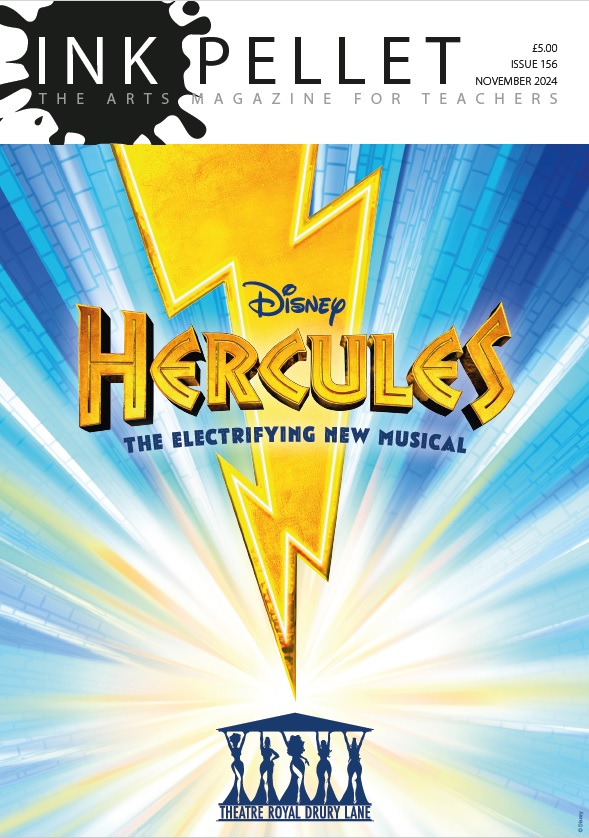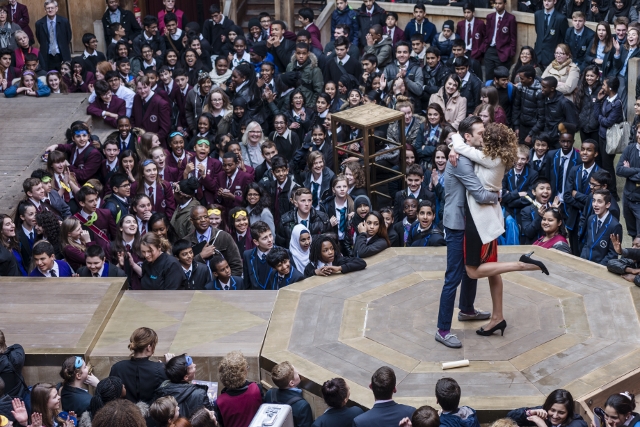For those living way outside London, read and weep with envy. As regular readers will know, Playing Shakespeare with Deutsche Bank is Globe Education’s flagship project for London schools, with 16,000 free tickets given to students. The 100-minute production, performed by Globe professionals, delivers compelling Shakespeare designed for 11 to 16 year-olds and enjoyed by people of all ages.
This year’s piece was The Merchant of Venice, a tricky and challenging play that is remarkably relevant to young people today. In fact, part of director Bill Buckhurst’s research included asking young people their views about the play. ‘It’s about debt,’ they told him.
Deutsche Bank’s investment allows Globe Education to offer top-notch CPD to teachers – 100 have taken part this year – free workshops to 3000 students, and a comprehensive website packed full of relevant, useable resources.
Head of Learning Georghia Ellinas said: ‘Part of my job is thinking about how we prepare teachers for teaching the play. We ran training sessions for teachers in how to engage with the text, talking about techniques and approaches, like how do you get children inside Shylock’s character?
How do you understand the language of the text? ‘What was wonderful this year was that instead of doing the training during the day we put on training post school, running twilight sessions. This was hard for teachers because they have been working all day but what it did do is allow whole departments to come. So we had one school where the entire English department came for three hours of training on the play. This gives the school consistency because it’s impossible to cascade three hours of training.’
Natalie Jim is the Drama Curriculum Leader at Sarah Bonnell School. She said: ‘The sessions are run by passionate practitioners who manage to showcase amazing ways to teach Shakespeare in a practical and enjoyable way, I am so envious that I was not taught Shakespeare like this. ‘I have changed the way that I approach the teaching of Shakespeare as a result and have always noticed a huge improvement regarding the engagement and quality of work from students.’
Alongside this teacher training, a wealth of material is put onto the website about the historical and social context at the time Shakespeare was writing. Georghia says: ‘This is an important part of the analysis of literature now – it’s always been there but it’s been beefed up enormously on the new curriculum. So this helps teachers introduce the play, to talk about the anti-Semitism that was rife throughout Europe at that time, and how they can make sense of why Shylock was living in the ghetto, being despised but also being able to lend money.’
Georghia added: ‘The Merchant of Venice was my choice of play for this year’s project because I thought it was important to offer a play that had themes and moral dilemmas in it that engaged young people today. The play was written 400 years ago but has content that is pertinent to us in the 21st century. ‘This is particularly true as it is a London-based project. The students, growing up in a multi-faith London, havea natural empathy with Shylock. The majority are non- Christians themselves and will belong to faiths that are viewed anxiously – recently Muslims have been viewed in a negative way – both are wrong. That’s why it’s important there is a play that challenges teachers and children to think about the uncomfortable things in life.’
The production was clever: for amidst the music – notably a mash-up of Happy by Pharrell Williams and Money (That’s What I Want), the colour of carnival, the modern visual references (the Jacuzzi for example), pantomime moments that prompted belly-laugh moments, there were times when the audience was still and silent. Listening as every wonderful word was articulated by a great cast that seemed to enjoy every moment. One could sense the moments when Shylock was reviled (his treatment of Jessica) and pitied (becoming a Christian was a genuinely shocking moment that brought a sharp intake of collective breath).
Georghia said the student workshops focus on character: ‘It is critical to engaging with a play and of course with Shylock we feel reviled by and angry and we feel desperately sorry for him. That conflict is so important. ‘We looked at different scenes and how Shylock behaves to show his complexity. You have to unpick why he does what he does. The scene around ‘O my ducats, o my daughter’ when you unpick this you find it is more than about money: he has lost her, and he’s lost the things that are important to him, such as the ring his wife gave him. How could she be so heartless as to take it and sell it? There are lots of cuts.’
Subira MuPendwa is a Year 8 student from Sarah Bonnell School. She said: ‘It’s really great studying Shakespeare and I understand it clearly. It’s not hard to understand the language anymore – without the activities, it was much harder. When we use the drama activities with our teacher it helps us to understand how the Jewish characters might have felt in the play. We also played the different suitors for Portia like in Blind Date – it was really fun!’
That’s the strength of this wraparound approach as Georghia explains: ‘If you just did the performance they would come and enjoy but it’s the immersion, preparation and understanding which means they get the most out of it. All the feedback we’ve had has been positive. ‘The way [director] Bill [Buckhurst] approaches it is by making it very relevant in terms of modern dress, characters they would recognise on TV – they can instantly pick up the correlation between the celebrity set: the lust for money, the lust for power. These are symbols kids can immediately recognise.
‘We have the best response so far with The Merchant of Venice – it completely challenges their thinking and that’s great because it doesn’t have to be straightforward – young people want to be challenged. ‘During one performance I was standing by a large number of Muslim girls and when Shylock was told he must become a Christian, a girl behind said, ‘they can’t do that! That’s not fair!’ Kids have a very strong sense of justice. While they knew what Shylock was asking for they understood how he was treated was not fair.’
To make the most of the microsite just head for http://2014.playingshakespeare.org/). It is packed with interviews, weekly updates – covering everything from costumes to design, blogs from the actors and loads of inspiring images of a performance in the making.



